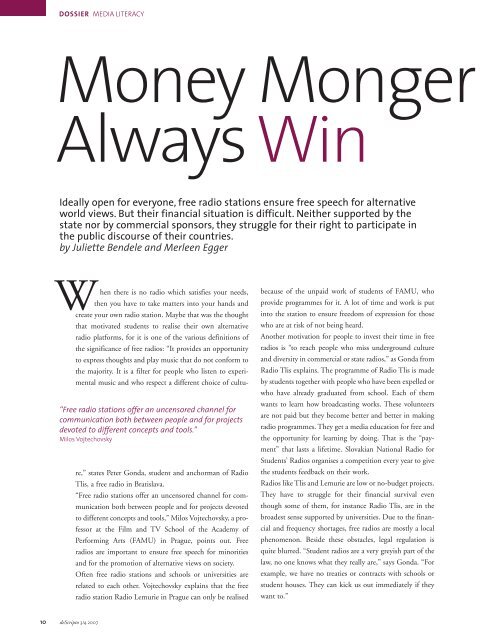DOSSIER
DOSSIER
DOSSIER
Create successful ePaper yourself
Turn your PDF publications into a flip-book with our unique Google optimized e-Paper software.
<strong>DOSSIER</strong> MEDIA LITERACY<br />
Money Monger<br />
Always Win<br />
Ideally open for everyone, free radio stations ensure free speech for alternative<br />
world views. But their financial situation is difficult. Neither supported by the<br />
state nor by commercial sponsors, they struggle for their right to participate in<br />
the public discourse of their countries.<br />
by Juliette Bendele and Merleen Egger<br />
When there is no radio which satisfies your needs,<br />
then you have to take matters into your hands and<br />
create your own radio station. Maybe that was the thought<br />
that motivated students to realise their own alternative<br />
radio platforms, for it is one of the various definitions of<br />
the significance of free radios: “It provides an opportunity<br />
to express thoughts and play music that do not conform to<br />
the majority. It is a filter for people who listen to experimental<br />
music and who respect a different choice of cultu-<br />
“Free radio stations offer an uncensored channel for<br />
communication both between people and for projects<br />
devoted to different concepts and tools.”<br />
Milos Vojtechovsky<br />
10 deScripto 3/4 2007<br />
re,” states Peter Gonda, student and anchorman of Radio<br />
Tlis, a free radio in Bratislava.<br />
“Free radio stations offer an uncensored channel for communication<br />
both between people and for projects devoted<br />
to different concepts and tools,” Milos Vojtechovsky, a professor<br />
at the Film and TV School of the Academy of<br />
Performing Arts (FAMU) in Prague, points out. Free<br />
radios are important to ensure free speech for minorities<br />
and for the promotion of alternative views on society.<br />
Often free radio stations and schools or universities are<br />
related to each other. Vojtechovsky explains that the free<br />
radio station Radio Lemurie in Prague can only be realised<br />
because of the unpaid work of students of FAMU, who<br />
provide programmes for it. A lot of time and work is put<br />
into the station to ensure freedom of expression for those<br />
who are at risk of not being heard.<br />
Another motivation for people to invest their time in free<br />
radios is “to reach people who miss underground culture<br />
and diversity in commercial or state radios,” as Gonda from<br />
Radio Tlis explains. The programme of Radio Tlis is made<br />
by students together with people who have been expelled or<br />
who have already graduated from school. Each of them<br />
wants to learn how broadcasting works. These volunteers<br />
are not paid but they become better and better in making<br />
radio programmes. They get a media education for free and<br />
the opportunity for learning by doing. That is the “payment”<br />
that lasts a lifetime. Slovakian National Radio for<br />
Students’ Radios organises a competition every year to give<br />
the students feedback on their work.<br />
Radios like Tlis and Lemurie are low or no-budget projects.<br />
They have to struggle for their financial survival even<br />
though some of them, for instance Radio Tlis, are in the<br />
broadest sense supported by universities. Due to the financial<br />
and frequency shortages, free radios are mostly a local<br />
phenomenon. Beside these obstacles, legal regulation is<br />
quite blurred. “Student radios are a very greyish part of the<br />
law, no one knows what they really are,” says Gonda. “For<br />
example, we have no treaties or contracts with schools or<br />
student houses. They can kick us out immediately if they<br />
want to.”

















